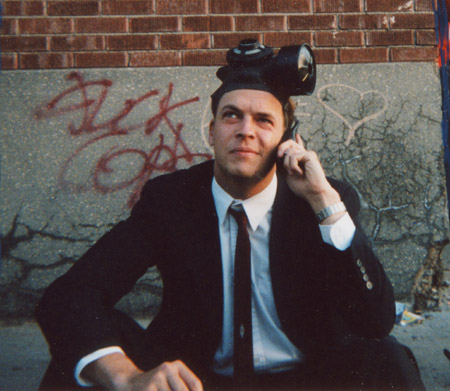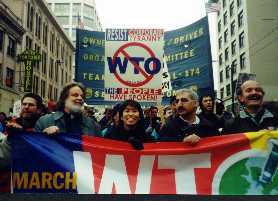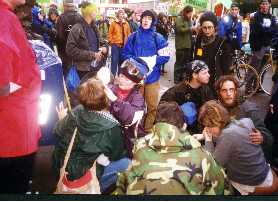|
Back to On the Road with John Tarleton
After Quebec, What Next?
by John Tarleton On April 20 thousands of people marched through Quebec City to the 11-foot-high fence that organizers of the Summit of the Americas had thrown up to keep protesters at bay while hemispheric leaders met inside to negotiate an ambitious new Free Trade Area of the Americas (FTAA). The fence, subject of months of debate, was torn down in a matter of minutes. The police responded with a barrage of tear gas that lasted for two days. Young militants battled security forces while as many as 60,000 workers, environmentalists and other concerned citizens marched through another part of town. Then, everyone went home. The Quebec protests were another milestone in a still nascent movement against corporate globalization. They turned the spotlight (at least in Canada) on the FTAA and the secretive negotiations behind it. But now what? How far can this new direct action movement grow beyond its countercultural base? Will it be able to affect real changes in a society dominated at every level by giant, transnational corporations? Are the mass actions that have defined the movement since Seattle still relevant? And, will a growing acceptance of using "a diversity of tactics" give this movement more flexibility or isolate it from the broader public it seeks to influence?
Global ResistanceAs Quebec emphatically restated, the urge to get in the way of those who wield global power continues to be irresistible, and a diverse, teeming ecosystem of protest has emerged in the past year and a half as demonstrators around the world contest the values and priorities of a corporate-driven globalization. The protest monoculture of the past—neatly structured groups falling in line behind recognizable leaders—is giving way to something distinctly different as scruffy anarchists, university students, renegade farmers, environmentalists, trade unionists, pagans, radical cheerleaders, Ghandian pacifists, unrepentant '60s radicals and others make common cause against a deregulated global capitalism.
Ironically, the U.S. military anticipated the emergence of a decentralized global resistance years before most radicals did so. In the 1993 article "Cyberwar Is Coming" military analyst David Rondfelt wrote, "the rise of networks, especially all-channel networks, in which every node is connected to every other node, means that power is migrating to non-state actors who are able to organize into sprawling multi-organizational networks more readily that traditional, hierarchical state actors can." A year later the Zapatista uprising erupted in Southern Mexico. Springing into action on the day (January 1, 1994) that the North American Free Trade Agreement (NAFTA) went into effect, the Zapatistas have offered a new paradigm for leftists. Instead of trying to seize state power like all previous guerrilla movements, the Zapatistas have sought to create more democratic spaces in their communities as well as in wider Mexican society. They have called for "a world that contains many worlds" and have offered Zapatismo as one example of resistance, not a template to be slavishly duplicated. The mass actions from Seattle forward have, at least in part, reflected that pluralistic vision. The tendency of protesters to hop from summit to summit has come under fire from both inside and outside activist circles. Yet, people keep on going. "There's definitely a crowd of 20-somethings who've been traveling from summit to summit," says Evan Henshaw-Plath, founder of the protest.net web site. "I'm one of them and it's a lot of fun...the biggest benefit is that all the people who are doing local actions are given a chance to connect and network. Whereas before, I think there was a pretty severe case of isolation." There will be mobilizations this summer in Cincinnati (anti-police brutality), Sweden (European Union), San Diego (biotech), Genoa, Italy (G8) and Bonn, Germany (climate conference). A June 25-27 World Bank conference in Barcelona, Spain was recently cancelled in the face of potentially large protests. For Paul Rosenberg, 51, a longtime Los Angeles activist, these mobilizations are indispensable.
Challenging powerful institutions can have powerful repercussions. Anti-globalization activists have been subject to scare campaigns in the media, infiltration of their meetings and organizations and trumped up charges in the criminal justice system. In one of the most controversial crackdowns to date, the 400 or so protesters arrested during last summer's demonstrations at the Republican National Convention in Philadelphia originally faced over 1,500 charges that could have collectively landed them thousands of years of prison time. For Marina Sitrin, 30, of the New York Peoples Law Collective, and other volunteers like her, keeping the Philly activists out of jail became a fulltime occupation. To date, the R2K Legal Office has raised and spent $230,000 and required 40,000 volunteer hours to successfully exonerate hundreds of activists.
Localizing the GlobalGretchen King, 24, is a media activist and a graduate student in social anthropology in the declining rust belt city of Syracuse, New York. She says activists should take the large issues raised at the mass actions and make them relevant in their own communities. "I think this movement has to start talking about the kind of survival issues that slap people when they walk out the front door," she says. FTAA teach-ins were held in Syracuse and the roster of speakers was sprinkled with local activists who could put global issues in focus--a union organizer talking about the globalization of trade in services and the plight of university workers, an anti-nuclear activist talking about the deregulation of the nuclear power industry under free trade, a local farmer relating the effort to produce regional organic food to the globalization of the agro-industrial complex. "It was an opportunity for people to both learn and to plug into stuff going on right where they are," King says. "They were engaging real people on these issues and I think that was important." Paul Engler is an organizer for both the Western Massachusetts Global Action Coalition and the Hotel and Restaurant Employees Union. A recent graduate of Hampshire College, Engler considers himself an anarchist, did jail solidarity after being arrested at last year's IMF/World Bank protests in Washington, D.C. and is well-versed in the "Seattle model" with its emphasis on affinity groups (autonomous cells of 5-20 people), spokescouncils (the loose knit decision making bodies that affinity groups use to coordinate their actions) and direct action. However, he also contends that radicals need to know when to shed some of their countercultural trappings in order to forge alliances with labor and other more mainstream allies. "When labor people or African-American people have to organize within the consensus model they are uncomfortable with it and the culture that comes with it," Engler says. "You have to reach out to people where they are at. Often you have to organize along pre-existing social patterns and institutions." The mass action model will face a new challenge in November when world leaders try to vanish into the Arabian Desert to hold the next WTO Ministerial in the Emirate of Qatar. Lisa Fithian of the Los Angeles Direct Action Network says the first thing activists should do is "claim victory." She suggests that activists may look to shut down stock exchanges around the planet when the WTO convenes on November 9. King has worked with microradio.net and the Emergency Broadcasters Bloc at several large actions and she suspects the genie is out of the bottle. "They (the protests) will become more localized," she says. "Just because we don't have access to their meetings, doesn't mean this will stop. We'll find new forms of protest. And that may be the best thing for the movement." British activists recently scored a coup when police practically shut down London on May Day in response to activists well-publicized plans to do "direct actions" at a "Monopoly board" of 26 pre-selected sites. In another vein, Rosenberg suggests that activists could converge on various cities and then disperse through the streets in bands of 10--each with a puppet, a banner, a drum and several leafleters dressed as clowns--before converging once more on a central location. "Having established the reality of protest whenever these meetings are held, we should feel free to RESHAPE what protest means," Rosenberg says, "particularly when they hide from us."
An Ongoing DebateThe FTAA protests in Quebec were among the fiercest to date. Security forces fired off almost 5,000 rounds of tear gas in two days, blanketing the population in a cloud of chemical irritants. Protesters, in turn, hurled everything from stuffed animals to hockey pucks to Molotov cocktails at the police. Whereas the action guidelines in Seattle called for protesters to forsake weapons, violence or property destruction, organizers in Quebec embraced the call for "a diversity of tactics", which some, like Engler, read as a euphemism for "anything goes." In the diverse new ecosystem of protest, Engler sees formations like the Black Bloc as a kudzu-like weed that threatens to overrun other life forms.
The "Next Big Event" in the United States will occur when the IMF/World Bank meet October 2-4 in Washington, D.C. Veteran activists like Fithian find themselves trying to both embrace and defuse more radical elements like the Black Bloc even as they grow in popularity. It is a dilemma that predates this new movement by 30 years. "The Black Bloc has captured the imagination of thousands of people," Warcry says, speaking slowly as she gathers her thoughts. "We can't define our resistance by what they (the media) define as acceptable. If we turn our backs on each other, then this thing will fall apart." A year and a half after Seattle, the trajectory of this most unorthodox (and unexpected) of movements remains uncertain. This story originally appeared in the New York Indypendent.
LA Kauffman: Direct Action In Our Time Back to Busting the Barricades: Canadians Rise Up Against the FTAA Back to On the Road with John Tarleton
|

 "We're facing down hundreds of years of colonialism and imperialism that's
now called globalization," says Warcry of the New York City Direct Action
Network. "We've taken on a lot, but that's O.K. That's what we want to do
with our lives—work to create a decent planet."
"We're facing down hundreds of years of colonialism and imperialism that's
now called globalization," says Warcry of the New York City Direct Action
Network. "We've taken on a lot, but that's O.K. That's what we want to do
with our lives—work to create a decent planet."
 "Big mass actions are a necessity," Rosenberg says. "They're exhilarating
and they expand people's sense of the possible. Continuing to challenge
plutocratic planning meetings simply cannot be stressed too much. The
basic notion of physically challenging these meetings is an incredibly
powerful one."
"Big mass actions are a necessity," Rosenberg says. "They're exhilarating
and they expand people's sense of the possible. Continuing to challenge
plutocratic planning meetings simply cannot be stressed too much. The
basic notion of physically challenging these meetings is an incredibly
powerful one."
 "I think the time and energy is (not only) worth it but absolutely
necessary," Sitrin says. "We need to protect and take care of each other.
The way we organize and take care of each other today is a reflection of
the type of world we want to create. It takes energy but imagine if we
didn't defend each other."
"I think the time and energy is (not only) worth it but absolutely
necessary," Sitrin says. "We need to protect and take care of each other.
The way we organize and take care of each other today is a reflection of
the type of world we want to create. It takes energy but imagine if we
didn't defend each other."
 "Violence is breaking apart the movement from the sides," Engler
says. "It's a small minority that unilaterally forces what they think
should happen at an action, whether they recognize it or not. Once you
accept the phrase, 'diversity of tactics', you've lost the argument,
because violence totally discredits people who are doing non-violent CD."
"Violence is breaking apart the movement from the sides," Engler
says. "It's a small minority that unilaterally forces what they think
should happen at an action, whether they recognize it or not. Once you
accept the phrase, 'diversity of tactics', you've lost the argument,
because violence totally discredits people who are doing non-violent CD."